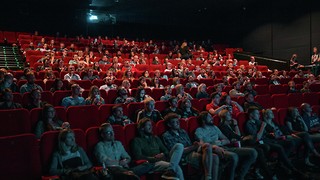‘We are about transforming people’s lives’
Oxfam’s Ducan Green tells Isabella Cookson why “Make Poverty History” is ‘absolute nonsense’

How do you fundraise to say that people in developing countries are too fat?” I am sitting with Duncan Green, Oxfam’s Chief Strategic Advisor and a lead thinker on development issues. He is here in Cambridge to promote the new edition of his book From Poverty to Power. “I think the perception of otherness is breaking down. People have got a lot more sense of what they have in common.
“All that work that we’ve done on supply chains – our clothes come from factories in Bangledesh or Indonesia and so forth, have increased awareness and changed perceptions. But if people are still fundraising by showing pictures of exoticism, of the sense of the “other” – you know, the woman with lots of necklaces standing in a field, then how do you fundraise for an obesity awareness campaign in South Africa?”
This is just one of the shifts in thinking that charities and NGOs have to start undergoing. The book was originally published in “insanely bad year to publish a book”, 2008. So Duncan Green is back, with a revamped edition that considers a changing global perspective bought about by the financial crisis, a world food crisis, the Arab spring, and the development of a new multipolar world order.
Charities and NGOs, he is adamant, need to change their tune. “The rudest I get about Oxfam, and I am fairly rude about Oxfam, is “Make Povery History”. It was a campaign in 2005 that basically said if we sort out debt, aid and trad we can “make poverty history”. Absolute nonsense! It’s a completely illiterate view of development! It would be nice to sort this out and it would make it slightly easier. But my book argues, quite controversially for Oxfam, that the place where change really happens is on a national level, in that interaction between citizens and states. We’ve got slightly overexcited about globalism, global citizenship, global activism.”
Green thinks we need to talk less about corruption and start looking more into the informal economies that are emerging with the states themselves. “I was in some shanty towns in Delhi last week, talking to women there. None of them had proper jobs as we would understand it. They were working as maids, selling things on the streets, getting a few days of work here and there. We used to think that was dying out, that it was a kind of old fashioned and that everyone would end up in salaried jobs. But actually it’s the informal economy that’s growing, not the formal economy.
“In terms of criminality, corruption’s everywhere, but corruption’s exaggerated in terms of importance. There’s plenty of corruption in the UK, in the US, in Japan; it doesn’t stop the countries from developing. It is an issue, poor people hate it because it makes them feel powerless and humiliated to be constantly hustled. It is indeed something we work on but it can be over emphasised. It some situations it’s just like an extra tax, in others in completely derails. It depends on the kind of corruption.”

That said, Green makes two exceptions to this focus. The first is climate change, and specifically the alarming rise in climate change scepticism. The second is the financial system. “The change that was promised after the disasters of 2008, the reforms of the system, hasn’t happened. The thing that worries me more than the regulation of the system is the sheer size. “The flows of capital across borders are already bigger than they were in 2008. The amount of capital that crosses borders every day is already a hundred times greater than the inflow of services and goods. So even a small shiver in the financial system has the capacity to wreck the world economy. No-one knows how to deal with this.”
Green was also Policy Analyst on Trade and Globalisation at CAFOD (the Catholic Agency for Overseas Development), and was keen to emphasise the challenge of the emergence of a multipolar world and its effect on the balance of power within issues of trade. I wonder what he thinks of the WTO, and whether he thinks its validity is being compromised by the stalemate of the Doha round. “They tried to get far too much into trying to determine policy behind the borders: rules on investment, rules on competition policy, which were beyond the remit of the GATT (General Agreement on Trades and Tariffs) and should be beyond the remit of the WTO. So it’s not the WTO that has collapsed but the trade round.
As people move from rural areas to cities, as rising powers develop, as the global climate changes, it is certain that the face of development work will have to change too. Duncan Green faces this reality and stares ambitiously into the future, believing that NGOs can make an impact. “Some people think that charities have got too big. It is important that they don’t become merely an education delivery company or food delivery service. “I think that we are about actually about transforming people’s lives and situations not just providing services. But the bigger we are the more we can do, small is not always more beautiful.”
 News / Tompkins Table 2025: Trinity widens gap on Christ’s19 August 2025
News / Tompkins Table 2025: Trinity widens gap on Christ’s19 August 2025 Comment / A plague on your new-build houses18 August 2025
Comment / A plague on your new-build houses18 August 2025 News / Pro-Palestine activists spray-paint Barclays Eagle Labs18 August 2025
News / Pro-Palestine activists spray-paint Barclays Eagle Labs18 August 2025 News / Pro-Palestine activists urge new Chancellor to ‘condemn Israel’20 August 2025
News / Pro-Palestine activists urge new Chancellor to ‘condemn Israel’20 August 2025 News / Trinity sells O2 Arena lease for £90m12 August 2025
News / Trinity sells O2 Arena lease for £90m12 August 2025









